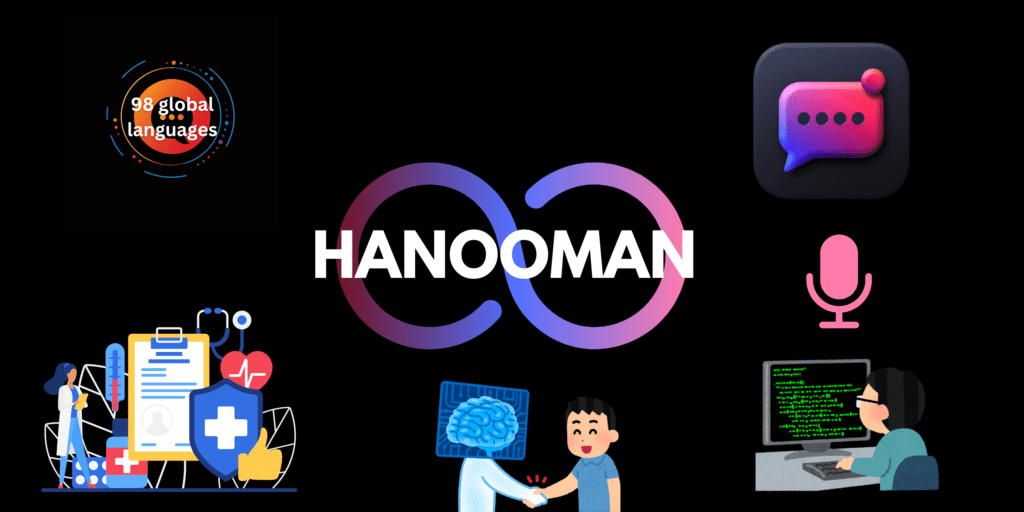Vishnu Vardhan, a former ballistic trauma surgeon turned technology entrepreneur, is leading their latest venture with his startup, Seetha Mahalaxmi Healthcare.
SML launched Hanooman Generative AI a homegrown multilingual AI platform. Next in line is developing an innovative Hanooman Operating System that promises to bring AI capabilities to a broader audience, aiming to make advanced technology more accessible and affordable.
Hanooman Operating System
Hanooman is a multilingual generative AI platform developed by SML India. It stands out as one of the largest and most affordable Gen AI platforms, supporting 98 global languages.
It includes 12 Indian languages such as Hindi, Marathi, Gujarati, Bengali, Kannada, Odia, Punjabi, Assamese, Tamil, Telugu, Malayalam, and Sindhi.
The platform is designed to handle various tasks, from casual conversations to offering professional advice and performing complex technical functions like coding and tutoring.
Hanooman’s multimodal capabilities extend across text, voice, image, and code, making it versatile for various applications.

Hanooman aims to serve four primary sectors healthcare, governance, financial services, and education.
It provides an open-source alternative to commercially available large language models, promoting accessibility and innovation in AI technology.
Vision Behind Hanooman’s OS
Vishnu Vardhan envisions a full-stack AI ecosystem, with the development of Hanooman’s operating system as a critical component.
This OS aims to revolutionize AI deployment by enabling smaller AI models that do not require the heavy computational power of GPUs.
Vardhan’s vision includes building a no-code platform that allows users with minimal technical knowledge to deploy AI agents quickly.
The Hanooman OS will be built on top of large language models, leveraging their capabilities to create tools for broader accessibility.
By enabling the OS to run on standard laptops, SML aims to bring edge computing to generative AI, making advanced technology more affordable and accessible.
This approach reduces dependence on expensive hardware and democratizes AI deployment.
Developing enterprise-grade small language models addresses concerns about API exposure in large enterprises.
Vardhan’s vision for the OS includes creating a secure and efficient environment for businesses to deploy AI solutions without significant infrastructure investments.
Technical Details
- The OS is built on top of LLMs, leveraging their capabilities to create a robust and versatile platform.
- LLMs allow the OS to expose APIs, enabling easy integration and deployment of AI agents.
- A significant innovation is creating a no-code platform that allows users with minimal technical expertise to deploy AI solutions.
- This democratizes AI technology, making it accessible to a broader audience and enabling rapid deployment and customization.
- The OS aims to operate efficiently on standard laptops, reducing the need for expensive GPUs.
- The OS can perform AI tasks locally by focusing on edge computing, minimizing latency, and relying on cloud-based infrastructure.
- The development of SLMs addresses specific enterprise needs, offering tailored AI solutions that are secure and efficient.
- These models provide a scalable alternative to traditional LLMs, mitigating API exposure and data security concerns.
- SML is working on building smaller, more granular AI models that can operate without the need for high-end GPUs.
- This approach reduces computational costs and enhances the flexibility and scalability of AI applications.
- The OS supports multimodal functionalities, including text, voice, image, and code.
- This versatility allows various applications, from casual interactions to complex technical tasks.
- The OS significantly lowers the cost barriers associated with AI deployment by enabling AI models to run on standard hardware.
- This makes advanced AI technology more accessible to small and medium-sized enterprises and individual developers.
Beta Testing
The development of Hanooman’s operating system is entering a critical phase, with the announcement of its beta testing next month.
This stage will involve a select group of users testing the OS under real-world conditions, providing valuable feedback to identify and rectify any issues.
The primary objectives of the beta testing are to assess the OS’s functionality, usability, and performance, particularly its ability to run on standard laptops and deploy AI agents without the need for high-end GPUs.
SML India plans to invite diverse participants, including enterprise clients, developers, and individual users, to explore the OS’s no-code platform, multimodal capabilities, and enterprise-grade small language models.
Feedback from these beta testers will be crucial in refining the OS to ensure it meets the diverse needs of its users.
The development team will use this feedback to make necessary adjustments and improvements, with regular updates and iterations released throughout the beta phase to address any identified issues promptly.
After beta testing, SML India aims to roll out the OS within three months. The rollout will include a full-scale launch, making the OS available to a broader audience.
SML India will implement comprehensive marketing and support strategies to ensure a smooth transition from beta testing to general availability.

Post-launch, the company will provide ongoing support and updates, establish a user community, and establish support channels to assist with issues and gather continuous feedback.
This structured approach to beta testing and the planned rollout reflects SML India’s commitment to delivering a robust and user-friendly OS.
Implications
The development and impending launch of Hanooman’s operating system have significant implications for the AI landscape, particularly in India.
By creating an accessible, affordable, and versatile AI platform, SML India is positioning itself as a leader in the generative AI space.
This move will likely stimulate innovation and competition, driving advancements in AI technology and applications.
By enabling the OS to run on standard laptops and eliminating the need for expensive GPUs, Hanooman makes advanced AI capabilities accessible to a broader range of users, including small and medium-sized enterprises, individual developers, and educational institutions.
This increased accessibility can lead to a surge in AI-driven projects and innovations across various sectors.
The focus on multimodal and multilingual support also positions Hanooman as a valuable tool for diverse applications, from healthcare and governance to financial services and education.
Its ability to handle text, voice, image, and code makes it a versatile platform that can be adapted to numerous use cases, enhancing productivity and efficiency across different industries.
In the long term, Hanooman’s development of enterprise-grade small language models can address specific business needs, providing secure and efficient AI solutions. This capability is significant for enterprises concerned about data security and the exposure of APIs.

By offering tailored AI solutions, Hanooman can become essential to enterprise infrastructure, driving digital transformation and improving operational efficiencies.
Hanooman’s multilingual capabilities, including support for 98 languages, including 12 Indian languages, position it as a competitive player on the international stage.
As AI technology evolves, platforms like Hanooman that prioritize inclusivity and accessibility will likely gain significant traction. This global reach can enhance India’s AI innovation and development hub reputation.
The forthcoming OS aims to democratize AI technology, making it affordable and easy to use across multiple sectors.
As the beta testing phase approaches, the anticipation for Hanooman’s full-scale rollout grows.
The innovative approach of reducing dependence on expensive GPUs and creating a no-code platform highlights SML India’s commitment to making advanced AI technology accessible to all.
With a clear roadmap and a focus on user feedback, Hanooman is set to become a cornerstone in the AI landscape, fostering innovation and driving digital transformation.


